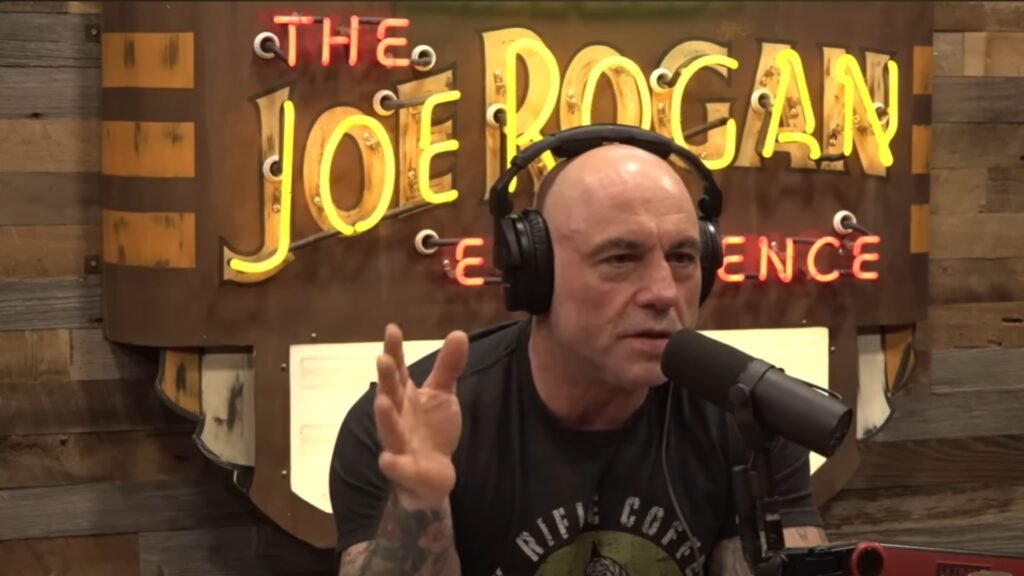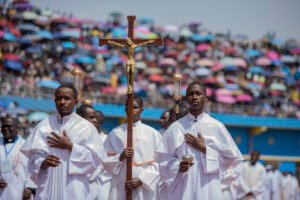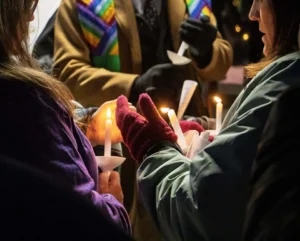Did Joe Rogan Start Going to Church? Exploring the Claims

Joe Rogan going to church?
https://youtu.be/5XGLnRzk9Zc
Introduction to Joe Rogan’s Influence
Joe Rogan is a multifaceted personality known for his work as a comedian, mixed martial arts commentator, and influential podcast host. His podcast, “The Joe Rogan Experience,” has become one of the most popular platforms for discussions on a wide range of topics, including politics, health, fitness, and spirituality. With a diverse array of guests ranging from scientists to celebrities, Rogan has been pivotal in shaping public discourse and challenging conventional viewpoints. His approachable conversational style and willingness to entertain fringe ideas attract millions of listeners, making him a significant cultural figure.
Rogan’s influence extends beyond his podcast; he has also expressed interest in various philosophies and worldviews, often referencing his experiences with different beliefs throughout his career. His exploration of topics such as psychedelics, wellness, and personal development resonates with a broad audience, contributing to the conversations surrounding mental health and self-discovery. This openness to various perspectives encourages viewers to question their long-held beliefs and explore new ideologies, positioning Rogan as a thought leader in modern media.
The recent claims regarding Rogan’s reported shift towards organized religion, specifically going to church, have sparked discussions among his fanbase and critics alike. This news could indicate a significant evolution in his personal journey, potentially leading fans to reevaluate their understanding of his beliefs. As we delve into the implications of these developments, it is essential to consider the broader context of Rogan’s on-air discussions and the diverse spiritual perspectives he has navigated over the years. Such a shift could reflect deeper introspections and an evolving worldview within his ongoing narrative as a public figure.
Understanding the Claim
The assertion that Joe Rogan has begun attending church has garnered attention, primarily stemming from comments made by Christian apologist Wes Huff. Huff, a known figure in religious discourse, suggested that Rogan’s recent explorations of spirituality might indicate a shift towards organized religion, specifically Christianity. This claim, while intriguing, requires careful analysis to understand its validity and context.
Wes Huff has gained recognition through his advocacy for Christian beliefs and his engagement in discussions surrounding the intersections of faith and modern culture. His background includes a history of presenting arguments that defend Christianity, which adds a layer of credibility to his assertions. Nonetheless, it is crucial to consider that Huff’s views are framed within a particular ideological context, potentially influencing the interpretation of Rogan’s actions. An analysis of Huff’s statements provides insight into how the notion of Rogan attending church might have arisen from his broader discussions about faith.
Additionally, Joe Rogan is well-known for his diverse perspectives and eclectic interests, often hosting guests from varying backgrounds, including those with differing religious beliefs. His podcast has featured numerous conversations on spirituality, philosophy, and the quest for meaning, which may have led listeners to draw conclusions about his own spiritual journey. Therefore, the context surrounding Huff’s claim must also consider Rogan’s tendency to explore various viewpoints without necessarily committing to one doctrine.
While Huff’s assertion might resonate with some audiences, it is vital to approach the claim with a critical mindset. Understanding the nuances of Rogan’s public persona and the nature of discussions within the podcasting landscape can provide a more comprehensive view of whether there is any substantiated evidence supporting the notion that Joe Rogan has actually started going to church.
Who is Wes Huff?
Wes Huff is a notable figure in the realm of Christian apologetics, recognized for his thoughtful and articulate discussions surrounding faith, spirituality, and cultural issues. As an apologist, he emphasizes the importance of defending religious beliefs through reasoned arguments and evidence-based discussions. Huff possesses a robust educational background in theology and philosophy, equipping him with the necessary tools to engage intellectually with contemporary figures and the complexities within modern society.
In his public discourse, Wes Huff frequently addresses the intersection of faith and popular culture, often exploring the beliefs of influential personalities, including podcast host Joe Rogan. His insights are shaped by a deep understanding of the spiritual landscape, which he navigates with a nuanced perspective. This approach allows him to critically evaluate how figures like Rogan influence public perception of religion and spirituality. Huff’s interactions with modern public figures are framed by his commitment to fostering meaningful dialogue surrounding faith, which is increasingly relevant in today’s media-driven environment.
Huff’s work has not gone unnoticed within the apologetic community and beyond. Through various platforms—such as podcasts, speaking engagements, and online content—he engages with wide audiences, inviting them to consider the philosophical underpinnings of their beliefs. His commitment to addressing the concerns of skeptics and seekers alike underscores his significance in discussions about faith and morality in a secular age. As discussions around Joe Rogan’s alleged church attendance circulate, it is essential to consider Huff’s perspective, as it provides a well-rounded view of the potential implications such claims may hold for both Rogan’s audience and the broader discourse on faith.
Details from CBN’s Discussion
In a recent conversation between Raj Nair of CBN and journalist Billy Hallowell, the topic of Joe Rogan’s evolving spiritual beliefs was explored in depth. The discussion unfolded in a thoughtful and respectful manner, highlighting various facets of Rogan’s potential journey towards faith, particularly the speculation surrounding whether he has started attending church. Hallowell shared insights regarding Rogan’s past comments on spirituality and religion, emphasizing that Rogan has always maintained an open dialogue about such topics on his podcast. The discourse suggested a noticeable shift in Rogan’s perspective over time.
During the exchange, Hallowell pointed out that Rogan, historically skeptical of organized religion, has recently shown interest in understanding different belief systems. He referenced episodes from Rogan’s popular podcast where guests with strong religious convictions discussed their journeys, revealing how these stories resonated with Rogan. This shift has led to speculation about whether these discussions could be influencing Rogan’s personal beliefs and practices, potentially guiding him toward a more faith-oriented lifestyle.
Nair added depth to the conversation by noting that Rogan’s increased openness to spiritual concepts may reflect broader trends in society, where individuals are exploring various aspects of spirituality outside traditional religious frameworks. The tone of the discussion suggested a sense of curiosity rather than judgment, allowing for a constructive examination of how influential figures like Rogan navigate their beliefs in the public eye. The exchange underscored the complexity of Rogan’s spiritual journey, indicating that while he may not have definitively committed to any religion, his ongoing exploration of faith is indeed noteworthy.
Joe Rogan’s Spiritual Journey: A Background
Joe Rogan, the renowned podcaster, comedian, and mixed martial arts commentator, has often been open about his views on spirituality and religion throughout his career. His exploration of these topics has unveiled a complex tapestry of beliefs influenced by personal experiences, eclectic interests, and a relentless pursuit of knowledge. Initially raised in a predominantly Catholic environment, Rogan’s relationship with organized religion began to shift during his teenage years. He frequently expressed skepticism towards traditional religious institutions, emphasizing the importance of personal experience over dogma.
In various episodes of “The Joe Rogan Experience,” Rogan has addressed the philosophical aspects of spirituality while often inviting guests from diverse backgrounds to share their perspectives. This eclectic mix creates a rich dialogue about belief systems, making it clear that Rogan values open-mindedness and critical thinking. He has explored topics such as psychedelics, meditation, and the profound human experience, often suggesting that these practices provide deeper insights into consciousness and existence beyond conventional religious teachings.
Moreover, Rogan’s interest in the martial arts has introduced him to Eastern philosophies, particularly those originating from Buddhism and Taoism. His commitment to self-improvement and mental well-being highlights a personal philosophy that intertwines physical discipline with spiritual exploration. Through practices such as meditation and mindfulness, he posits that individuals can gain a higher understanding of reality, transcending the limitations often imposed by organized belief systems.
Ultimately, Rogan’s spiritual journey reflects a dynamic evolution shaped by curiosity and a desire for authentic experiences. Rather than adhering strictly to a specific faith, he embodies a more personalized approach to spirituality, emphasizing the importance of individual exploration in the quest for meaning. Understanding this multifaceted journey provides valuable context for interpreting any recent claims about his current spiritual practices.
Audience Reactions and Public Perception
The speculation regarding Joe Rogan’s supposed attendance at church has ignited a diverse range of audience reactions across social media platforms. This pivotal claim has not only captivated his listeners but has also sparked widespread discussions among various communities online. As a prominent figure in the podcasting arena, Rogan’s decisions and lifestyle choices often shape public perception, influencing how fans and skeptics alike view his character and values.
Many fans have taken to platforms such as Twitter and Instagram to express their thoughts, with some expressing support for his newfound spiritual journey. These supporters argue that Rogan’s potential church attendance could signal a deeper exploration of personal beliefs and values. For them, this evolution represents a positive transformation towards introspection and community-oriented values—a stark contrast to the more polarized discussions often associated with his podcast content.
Conversely, there are others who have responded negatively to the rumor, arguing that it contradicts the persona Rogan has cultivated over the years. Critics speculate that if Rogan indeed begins to identify with religious practices, it may alienate a segment of his audience that appreciates his secular, often irreverent commentary on various topics. The duality of responses exemplifies the complexities surrounding personality and belief, especially in the context of a highly influential public figure like Rogan.
As the discourse unfolds, it will be interesting to observe whether this news impacts Rogan’s image in the podcasting landscape. Given his substantial following, any significant shift in his views might prompt broader discussions concerning the intersection between belief systems and personal branding in the entertainment industry. The implications of these reactions signify the intricate nature of celebrity culture, where even personal choices can reverberate throughout public perception.
The Role of Spirituality in Public Life
In recent years, the role of spirituality within the public sphere has become an increasingly pertinent topic. This trend reflects a shift in how individuals, including prominent figures such as Joe Rogan, engage with faith and religious practices in a society that often grapples with questions of meaning and moral direction. As a high-profile personality, Rogan’s public engagement with spirituality could significantly influence how audiences perceive faith and its relevance in contemporary life.
The intersection of celebrity, spirituality, and media often creates a complex dynamic where public figures become symbols for broader cultural conversations. When a well-known individual openly explores their spiritual beliefs or religious practices, it can invite varying responses from their audience, ranging from curiosity to skepticism. For example, if Rogan were to attend church regularly or participate in public expressions of faith, it might inspire fans to reflect on their own spiritual journeys, while simultaneously drawing criticism from those who view such moves as pandering or insincere.
This phenomenon also underscores the power of media in shaping public discourse on spirituality. In a media-saturated environment, the experiences and beliefs of celebrities can gain traction, influencing societal norms and expectations around faith. Individuals often look to the actions and viewpoints of public figures for guidance or validation in their personal beliefs and practices. Therefore, if someone like Rogan were to embrace spirituality publicly, it could potentially pave the way for more open discussions about faith in a largely secular culture.
Moreover, this intersection can help to demystify spirituality, making it more accessible to a wider audience. By engaging with religious spaces, a figure such as Rogan might help to bridge the gap between secular and religious communities, fostering dialogue that is vital to enhancing mutual understanding and respect in a diverse society.
Comparative Analysis: Other Podcasters and Faith
In recent years, the intersection of podcasting and faith has become a topic of burgeoning interest within the public domain. Joe Rogan, a prominent figure in the podcasting realm, has recently sparked discussions concerning his evolving relationship with faith. To better understand Rogan’s journey, it is beneficial to examine other podcasters and public figures who have similarly embraced religious beliefs or spirituality publicly.
One notable figure is Russell Brand, a British comedian and podcaster whose spiritual journey has been well documented. Brand underwent a significant transformation from a life of substance abuse to one characterized by a deep exploration of spirituality and personal growth. His candid discussions regarding faith and personal beliefs have resonated with many listeners. Unlike Rogan, who often approaches topics from a pragmatic, sometimes skeptical standpoint, Brand’s engagement with faith is imbued with a more emotional and subjective perspective, emphasizing the transformative power of spirituality.
Another example is Dax Shepard, host of the podcast “Armchair Expert.” Shepard has openly discussed his struggles with addiction and the role that faith and spirituality play in his recovery process. His approach is similar to Rogan’s, as both utilize their platforms to talk about personal experiences; however, Shepard leans more heavily on the influence of traditional faith practices, contrasting Rogan’s more philosophical exploration of belief systems.
The reactions to these podcasters vary significantly among their audiences. Some fans embrace their spiritual insights, while others express skepticism regarding their authenticity. This division echoes the mixed responses Joe Rogan has received since rumors of his increased religious inclination surfaced. The broader trend suggests a growing acceptance of personal faith narratives in public discourse but also highlights the complexity of individuals’ relationships with spirituality in the realm of modern media.
Conclusion: The Search for Truth
The exploration of Joe Rogan’s reported church attendance has sparked significant discussion, reflecting on the implications of such a shift in the life of a prominent public figure. As detailed throughout this blog post, the narrative surrounding Rogan’s spiritual journey embodies not just a personal evolution but also a broader conversation about faith in contemporary society. For many of his listeners and fans, understanding Rogan’s potential transition towards organized religion may prompt them to reevaluate their own beliefs and the role spirituality plays in their lives.
Rogan’s influence as a cultural commentator and host of one of the most popular podcasts has made him a catalyst for discourse on various topics, including health, wellness, and the pursuit of meaning. Should he genuinely be integrating church attendance into his routine, it could serve as a symbol of seeking connection in a fast-paced world increasingly characterized by skepticism and disconnection from traditional belief systems. The reported information raises questions about the motivations behind such a change, whether it stems from a genuine search for spiritual understanding or serves as a social experiment highlighting the complexities of faith.
As we navigate these conversations, it is essential to reflect on our individual relationship with faith. How do personal beliefs shape our perceptions and interactions in a society where religion can often be a divisive subject? Engagement with these questions not only enhances our understanding of Rogan’s journey but also fosters broader discussions about the meaning of community, spirituality, and the search for authenticity in an era marked by uncertainty.
In conclusion, the nuances surrounding Joe Rogan’s potential church attendance offer a lens through which we can examine the evolving landscape of belief and belonging. Each of us is invited to contemplate our stance on faith and how it influences our lives and connections with others.












